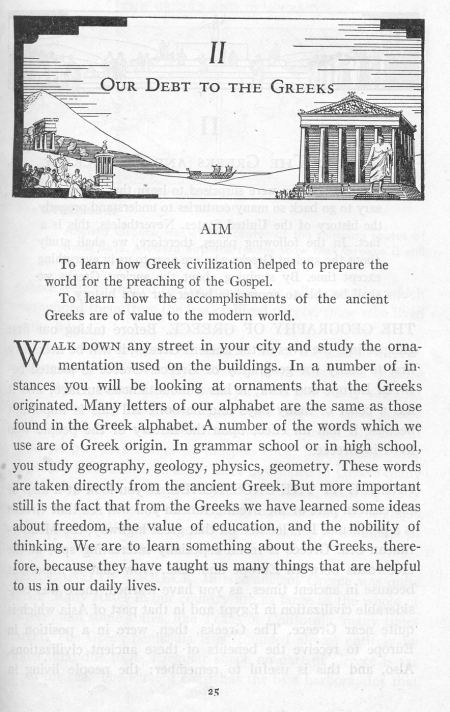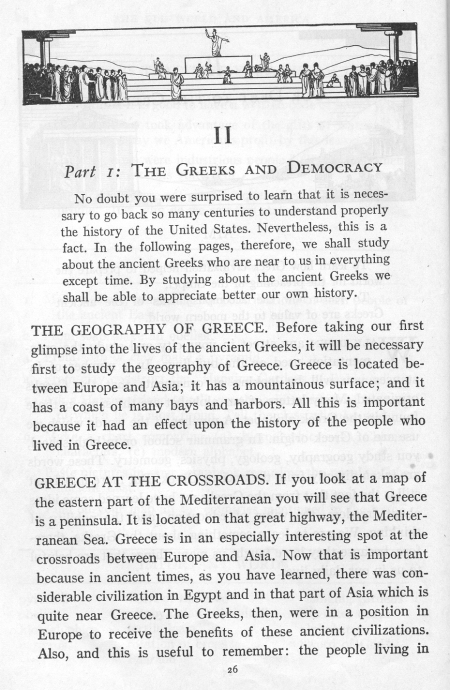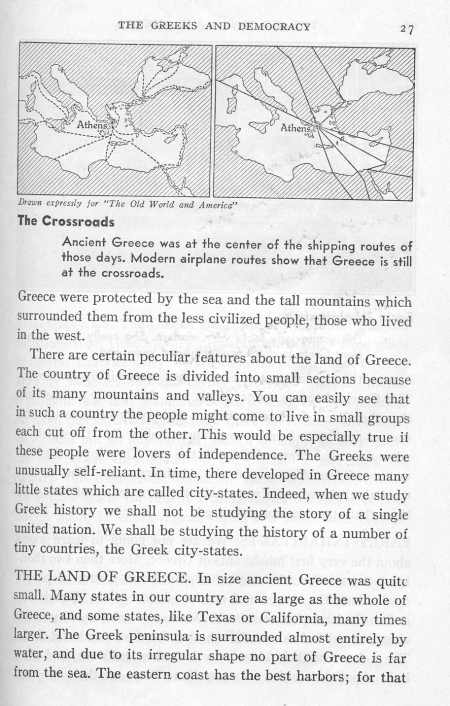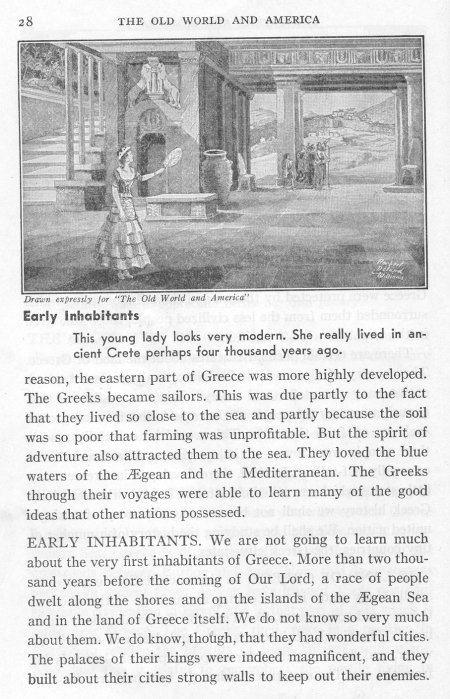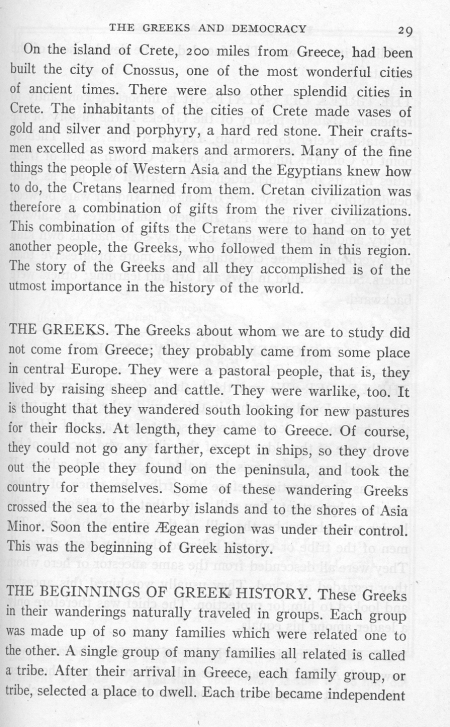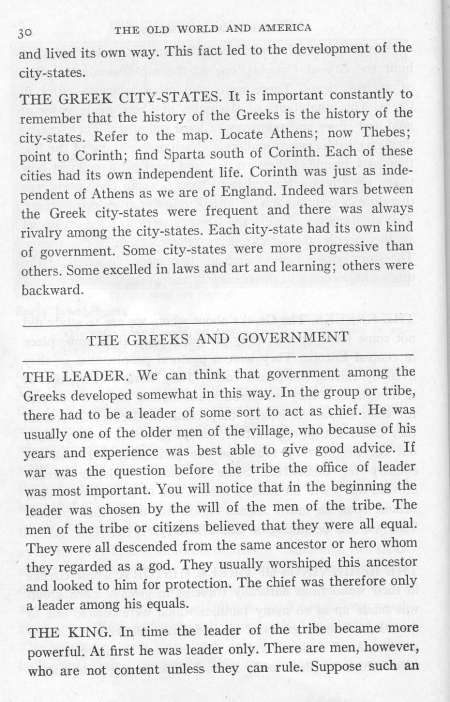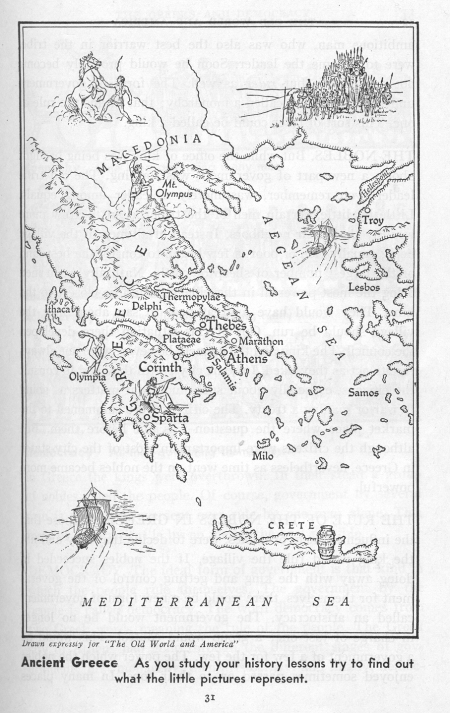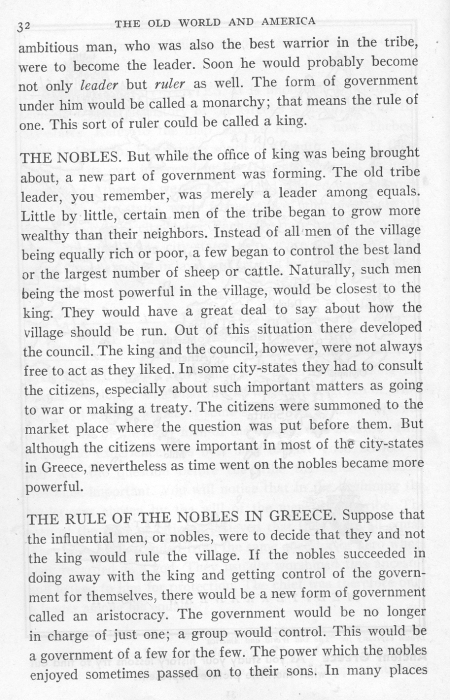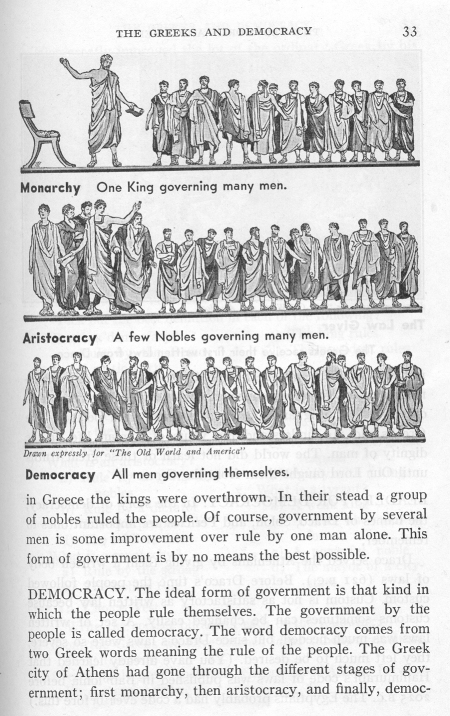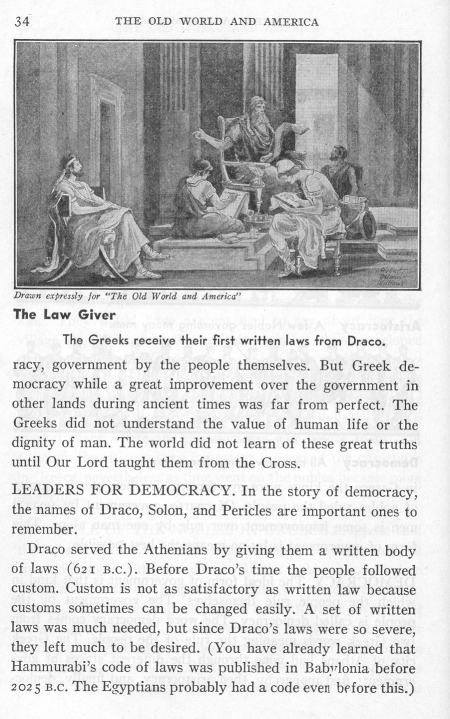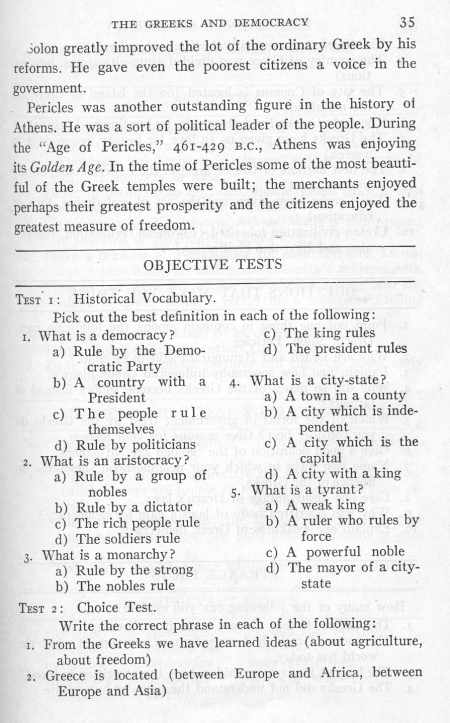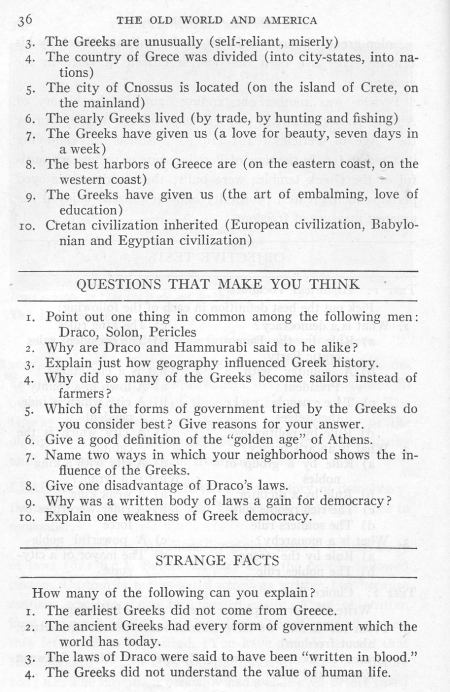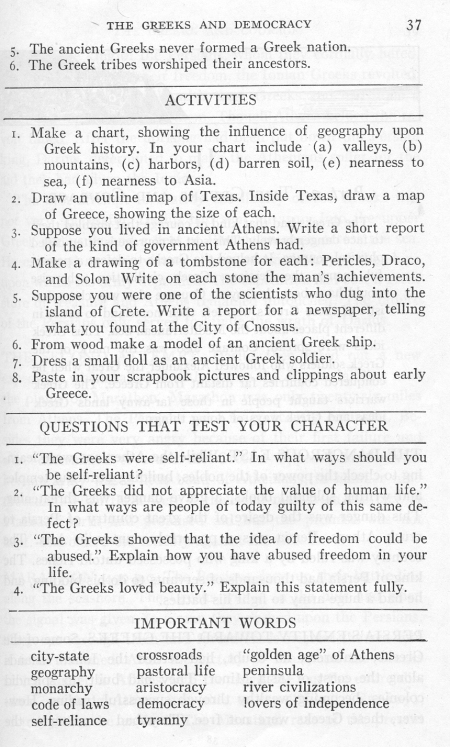Sample Pages from [em]The Language of God for Little Folks[/em] Level C by Nancy Nicholson
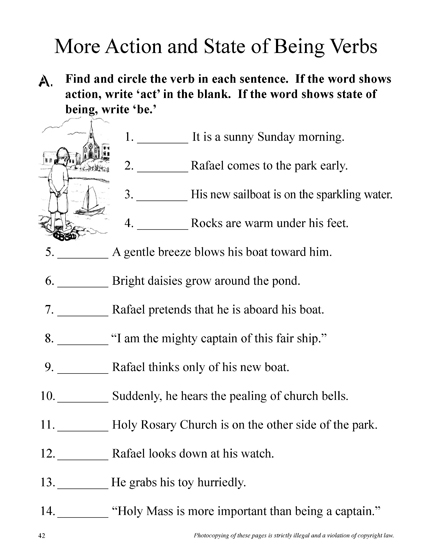


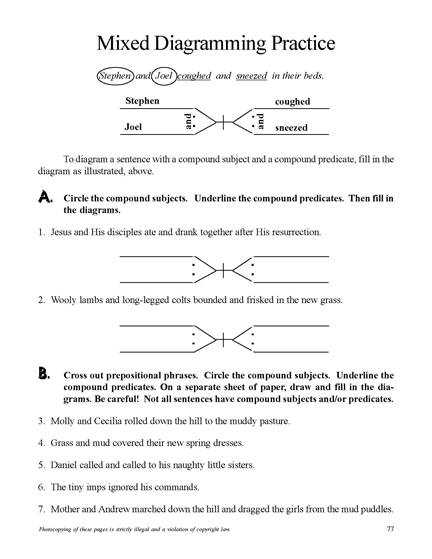
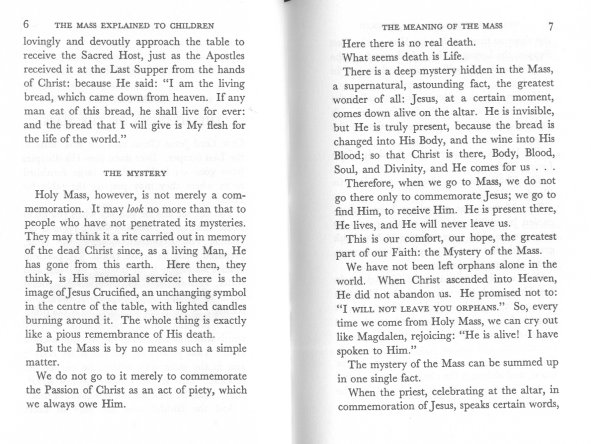
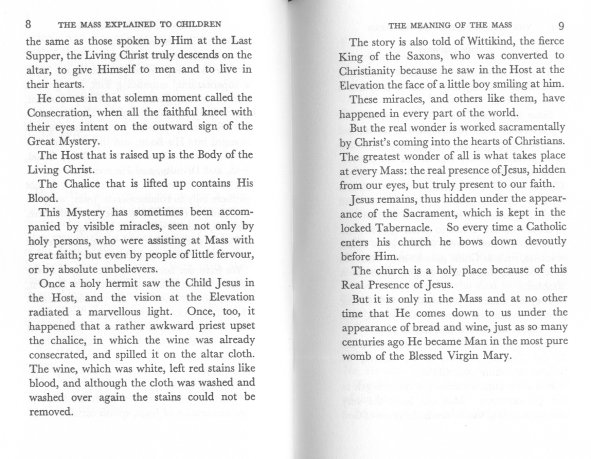
IN THE HOT July sun Washington's Union Station seemed like a vaulted oven. Joan felt the heat more than the other Mitchell children because she rushed around so. She could see little sweat drops glistening on her nose when she shut one eye. She tried it first on the left side and then on the right. It made her forget about Daddy. Joan hated "good-bys" and this one was going to be terrible, worse even than when Uncle Jim had left. Daddy hadn't been drafted very long yet, and the Mitchells had hoped he would have a long period of training first, like Uncle Jim. But the Navy needed electrical engineers so badly that they had made Daddy a lieutenant right away and after a few weeks' training he had been assigned to a ship. Now his family was seeing him off.
A lot of other people seemed to be leaving at the same time as Daddy. The station was full of uniforms, weeping ladies and shrieking children. Joan hoped Mother wouldn't cry. She knew Grannie would, but Grannie was so old Joan felt sure people would understand and forgive her. Besides, there were strangers who were sobbing too, and Joan appeared to be the only one who blushed for them. One soldier had to take leave of a dog, and the dog didn't understand. He was a strong dog and he was dragging a red-eyed lady around on a leash. When the soldier tried to rush past the ticket collector, the dog gave a howl and bounded after him, tripping up Daddy with the leash. Luckily Daddy was able to catch his balance in midair.
"Dogs!" he muttered in a tone of rage. Daddy hated dogs.
"I'm so sorry," began the lady on the leash, but the dog didn't wait for her to finish. He whisked her off and she soon vanished in the crowd.
"Dogs!" repeated Father, almost sounding like one himself, he growled so. "Useless parasites of civilization, objects of slobbering sentimentality, verminous vandals...."
"Daddy, don't say such bad words!" cried Joan, shocked. Daddy's blue eyes twinkled down on her.
"Joan," he said, "I know you and I warn you. Don't you go filling my house with animals while I'm gone. I don't want to come back to a zoo! And especially, no dogs! Do you hear?"
"Yes, Daddy," said Joan meekly, though with a heavy heart. Joan loved animals and longed for a pet, but Daddy said five children were noise, confusion and expense enough.
"Hurry, John!" cried Mother, who was trying to keep her youngest daughter from being trampled underfoot. "We're late!"
Joan's heart skipped a beat. What if Daddy missed the train and let the ship go off without him? Would he be courtmartialed? They were very strict in the Navy.
"Daddy! Daddy! Hurry!" she cried, tugging at his uniform.
But Daddy was as calm as ever. Now they were shoving past the ticket collector and there beside the platform stood the train, panting to leave. Lieutenant Mitchell took a hasty farewell of his family. First Grannie, then Mother, who held Baby Timmy, then Joan, Patsy, Peter and Angela. The train was already in motion when he jumped on, his cap at a rakish angle.
"Don't forget your gun!" shouted Peter after him. "And shoot first, hear?"
"And bring back a baby-orphan from Europe!" yelled Patsy. Daddy was already too far off to hear, which was just as well, thought Mother. She had enough children to take care of at present.
"You take Peter and Patsy, Grannie, will you?" she said. "And watch out for those luggage carts. Joan! You hold Angela."
Another train thundered into the station, oozing passengers, who pushed past Mother and unsettled her pretty new hat with the red cherries. It dropped over one ear, giving Mother a wild look as she clutched Timmy and tried to watch over the other children as well.
"Take care!" she cried, but Joan had already caught Angela before the child could fall off the platform.
Angela was the beauty of the family and she had need to be, as Mother often remarked grimly. If she hadn't been so cherubic, with long blond curls, wistful blue eyes and the most enchanting little legs in the whole wide world, she'd surely have been disowned long ago! She was more trouble than the rest of the family put together. Now she set up a howl as Joan attempted to force her to follow the family procession.
"My shoe!" she screamed. "My li'l shoe!" Joan looked down. Yes—Angela was walking on one sock and one shoe.
"Mother! Mother!" cried Joan. "Wait!" Mother heard her, notwithstanding the roar and rumble of traffic.
"What is it?" she asked, turning around.
"Angela has lost her shoe."
"Oh my goodness," sighed Mother. "And I've spent my last shoe stamp. We'll just have to find it." She gazed around at the shuffling crowd.
"Grannie!" she cried. Grannie had gone on, not noticing the interruption, but Peter pulled her to a standstill.
"Mother is calling you."
"Yes, what?" said Grannie. She was thinking of Daddy and it was hard to make her understand.
"Shoe? Which shoe?" she asked.
"Never mind," said Mother. "You go on with Peter and Patsy; we'll find you in the waiting room. I've got to hurry and look for that shoe."
So Grannie walked on with her portion of the Mitchell family, while Mother straightened her hat, settled Timmy firmly on her arm and ran back to Joan and Angela, who each wanted to go in a different direction. Poor Joan's face looked like a radish.
"It's no use," she cried bitterly. "I can't do a thing with her." And with melancholy eyes she watched a bead of sweat roll down her nose and jump off at the tip.
"My shoe!" cried Angela in a heartbroken voice. "The pretty li'l one!"
"Where did you lose it?" asked Mother, peering around in vain.
"Down there," said Angela, pointing a fat little finger at the tracks. "I threw him."
"You threw it?" cried Mother indignantly. Joan couldn't help laughing, and after casting an angry look at her, Mother had to laugh, too. The little white shoe perched jauntily on one of the gleaming steel tracks.
"How shall we ever get it back?" sighed Mother.
"Why don't you ask a porter?" suggested Joan.
"I see one there," and she was off, presently returning with a redcap, who took in the situation at once.
"I'll have it for you in a jiffy, ma'am," he promised, lowering himself to the tracks while Joan watched anxiously for possible trains. The porter picked up the shoe, dusted it on his sleeve, and leaped back on to the platform with astonishing agility.
"Now don't go losing it again, honey," he told Angela as he bent to put the shoe back on her foot. Angela rewarded him with a golden smile. The porter flashed his teeth at her and straightened up again.
"Lawdy, ma'am!" he cried, rolling his eyes and pointing at Timmy, who sat still as an angel on Mother's arm. "That chile is eating your hat!" Mother hastily lowered Timmy to look at him. The baby gazed back at her complacently, his face smeared with red paint. In his hands he held the pretty bunch of imitation cherries, several of them obviously missing.
"Goodness, I hope they're not poisonous!" cried Mother, trying to clean Timmy's face with her handkerchief.
The redcap laughed. "I don't reckon so, ma'am," he murmured consolingly. "They're just paper and paint; he'll never notice it. It was your hat I was thinking of, such a pretty hat, too. Give me the boy, I'll tote him for you; you look plumb tuckered out." And the good-natured porter took Timmy and put him on his shoulder. Timmy gazed triumphantly down on Mother.
"That is a relief," sighed Mother gratefully, fanning herself with her plucked hat.
"Where were you all fixing to go?" asked the redcap.
"To the waiting room," said Mother, hurrying to keep up with his long strides. "I have more children there, waiting with my mother-in-law."
"Whew!" whistled the porter. "How are you all going to get home?"
"In a taxi, I suppose," said Mother wearily. She couldn't face the long bus journey after all this. It meant changing into another bus, half-way, too.
"You'll need a moving van," the redcap told her. He pushed ahead, Timmy crowing with delight at seeing so much of the world. Mother and Joan followed, with Angela between them.
When they arrived at the spacious waiting room with its ocean of seats, Mother asked: "Do you see Grannie anywhere?" Joan peered around.
"No," she said.
"I wonder where she went?" murmured Mother.
"There's a lady's waiting room further on," the porter pointed out helpfully. "Perhaps she went there."
"Yes . . ." said Mother. "That will be it," and she made a motion to go on, but Joan had caught sight of a glass counter and cried:
"Oh! Look at the lovely toys!"
"Hush!" cried Mother warningly, but it was too late, Angela had heard.
"Which toys?" she cried, pulling herself loose and streaking off in the direction Joan had pointed.
"Oh dear, I'm sorry," said Joan. Mother shrugged her shoulders. It couldn't be helped, and slowly they followed Angela, who was already squatting on the floor before the counter, wrapped in bliss.
"Oh! see? Look at the pussy, oh, the sweet pussy! Oh Mommy, Mommy, I want the pussy! I want that pussy, Mommy, that cute li'l pussy!" Angela jumped to her feet again and skipped up and down in a frenzy of joy, her curls flying, her eyes blazing blue fire.
"How much is it?" Mother asked timidly of a very superior lady who sat behind the counter, slowly chewing gum with an air as if the toys were no concern of hers.
"Oh, that..." she said, looking down her nose at the true-to-life fur kitten of Angela's choice.
"Two-ninety-eight," she announced.
Mother was aghast. "For that little thing?"
"Oh, Mother, buy it for her!" pleaded Joan. "She likes it so much."
"But I can't," said Mother wildly, remembering the few dollar bills in her slender purse which still had to yield the taxi's fare as well as the porter's tip. "I just can't."
Angela looked incredulous. She couldn't have that pussy? Unbelievable! She sat down on the ground and started a howl which seemed to come from the toes of her little feet, winding its way through her chubby body and exploding from her rosy lips with the force of a blackout siren. Even the lady behind the counter stopped chewing and took notice.
"She can't do that here," she remarked in an injured voice, frowning down on what she could see of Angela through two layers of glass.
"Oh, can't she?" echoed Mother bitterly.
But Joan had already taken the matter in hand. Seemingly heedless of Angela, she studied the pussycat with cold disdain.
"I don't like that pussy," she said loudly. "I bet it can't walk, or scratch, or mew, or even purr." Angela stopped screaming and listened. She had been disappointed in toys before. Was this pussy, perhaps, not as perfect as it seemed?
"It is, too, a neat pussy," she said defiantly.
But Joan perceived that her words had taken effect. "Santa Claus has much neater pussies..." she began. "And look... there's Grannie!" Yes, there was Grannie, who had waxed impatient and had sallied forth, remembering that Mother might have meant the general waiting room after all.
"Oh, I'm so glad you're all right," she cried, seeing the little group before the glass counter. "I was afraid something had happened to you."
"And I," began Mother, but she was interrupted by shrieks from Peter and Patsy, who had discovered the toys, while Angela ran to her grandmother and poured out her woes.
"Mommy won't buy the li'l pussy," she said, pointing to the kitten.
"Oh, I'll pay for it," said Grannie immediately, opening her bag.
"Grannie dear, you mustn't," cried Mother, alarmed. "It's two-ninety-eight."
"Buy me something, buy me something," cried Peter, Patsy and Joan, dancing around like wild Indians.
"Don't you all want a taxi now?" asked the porter, growing impatient at last. But Grannie had approached the glass counter, fumbling with her purse, and Mother sighed.
"You'd better give the baby to me if you are in a hurry," she told the porter. "I can see we won't be through here for some time. Please, Mother," she begged, laying a hand on Grannie's shoulder, "Don't ruin yourself. Let me pay for this; I can take it out of next month's allowance."
But Grannie was stubborn. "I don't have to go to the hairdresser now John and Jim have both left," she said. "I'll wash my own hair and be rich." Mother couldn't say anything after that, for Angela had grabbed her pussy and run away with it like a dog with a bone, doubtless fearing that Grannie might change her mind. She was half-way down the huge room before Mother caught up with her.
"I want candy," she announced as her eyes lit on a slot-machine. Mother got her some.
"It's all wrong," she thought. "The child is being spoilt, but we've got to get home some time," and she walked quickly back with a now radiant Angela.
Grannie was sitting triumphantly on a bench with Timmy on her lap. The redcap had gone and the other children were blissful with presents. Joan and Patsy had each chosen a children's magazine and Peter was zooming a little wooden airplane about.
"I paid for everything," crowed Grannie, "even for the porter."
"You shouldn't have done it," murmured Mother, but she felt relieved and began to cheer up. "Come along, chickens," she said. "Peter, don't fly that plane, it might hit someone."
But Peter had already let it go and it did hit someone, a fat gentleman who looked annoyed and crushed it with his foot. Peter picked up the wreck and wept over it. The other children gathered around to mourn with him.
"Come along," cried Mother. "I still have to cook dinner! It was your own fault, Peter. I told you not to fly it here, it's too dangerous."
"I had to," Peter defended himself. "In a war you can't just stay home because it's safer!"
"Perhaps that man was an anti-aircraft gun," suggested Patsy.
"No, he looked more like a barrage balloon," remarked Joan.
"Yes," agreed Peter, and a smile shone through his tears. He lovingly wrapped the remains of his plane in his handkerchief, with a vague idea of "gluing" them when he got home.
"Come, children!" cried Mother from afar. "We have to get a taxi!"
"A taxi? Are we going in a taxi? Oh boy!" And the children ran like hounds after a scent.
"May I sit in front? May I? May I?"
"Peter may," Mother decided, "because he was good about his wrecked plane."
They still had to find a taxi, however. There was a crowd waiting and there weren't enough taxis to go around. People had to double up. But, as Joan remarked, the Mitchells were double already, and when they at last had their taxi they filled it completely. Peter and Patsy were squeezed in front with the driver, congratulating each other on their luck.
"We see all the new things, and in the back they see only old things," Patsy summed up. Then they took the driver into their confidence and told him that their Daddy had gone to the war.
"Why don't you go to the war?" asked Patsy. "You're a man, too."
"They won't have me," grumbled the taxi driver. "I'm too old."
"Oh." The children looked at him. He did look rather old with wrinkles in his face and whitish kind of hair. Not as white as Grannie's, but white as a spider's web. Grannie's was white as a Christmas tree angel.
"It's like me," said Peter. "I'm too young." The taxi driver's face grew still more wrinkled as he gave Peter a sideways glance.
"I guess you are, at that," he admitted. "How old are you?"
"Six," said Peter. "And anyway, I've to look after my family."
"Oh," said the driver. "You've a family, have you?"
"Well, all of us," explained Peter, sweeping his arm around and hitting Patsy in the face. Patsy protested, but Peter paid no attention.
"I'm the only man in the family, the only one that can talk. It's a big... a big... what was the word Daddy said, Patsy?"
"I don't care," sulked Patsy. "You hit me."
"Well, anyway," Peter went on hurriedly, "I've a lot of expendents."
"Dependents, you mean," chuckled the taxi driver. "Or is it expenses?" Peter thought it better to let it go. That was the trouble with new words—they were very attractive, but people were always asking what they meant.
"Daddy had to go to the war because people were making so many mistakes," he explained, changing the subject.
"Yes," said Patsy. "I guess we'll win soon now."
"It can't be too soon for me," sighed the taxi driver. "I've got two sons in Italy."
They were nearing Chevy Chase circle and soon the children cried:
"Here we are! Here we are!" as the taxi stopped in front of a comfortable stucco house, which looked rather the worse for wear. Several dolls and a toy gun lay scattered over the front steps. While Mother paid the driver Grannie lifted Timmy out and the other children stumbled on to the sidewalk without assistance. The house looked cold and empty, and Joan remembered that it was Cora the maid's day off.
She skipped up the steps and went to open the door. She pulled at it and pushed and kicked. She rattled the knob. It wouldn't open. Patsy and Peter came and pushed and rattled and kicked, too, but it didn't help. The door was definitely locked. Oh, well! They ran to the back door and tried it. No, sir, locked, too. Then they went to the cellar door. Also locked. Joan thought this must be the very first time since they lived in the house that all the doors were locked at the same time. The children ran back to the front again. Mother was coming up the steps, loaded with Timmy, and Grannie came puffing after her.
"The doors are locked!" cried Peter.
"Oh!" Mother sat down on a step and tried to open her bag while balancing Timmy on her knee.
"I'll take him," said Joan eagerly, grasping her fat little brother in her strong arms and lifting him up.
"Oh dear," cried Mother, rummaging frantically through her bag and scattering ration books, fountain pen, spectacles, stamps and letters around her. "Oh dear, how stupid, how ridiculous—whatever shall we do?"
"What is it, Mother?" cried the children. Mother looked ready to burst into tears. She wiped her forehead, pushing her hat back, the sorry hat without its cherries, and glanced up at the closed house.
"Oh, nothing," she sighed. "Only—Daddy has the key."
